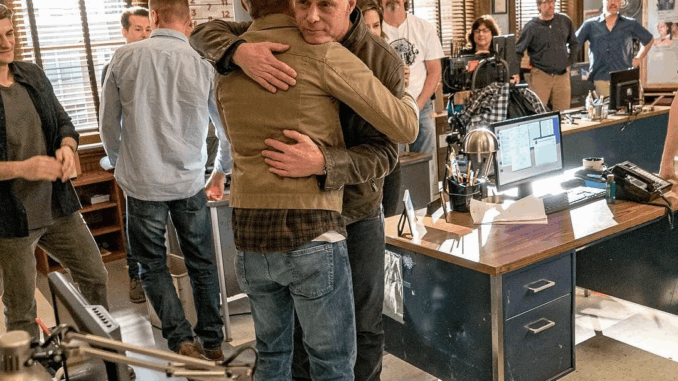
On screen, the cast of Chicago P.D. bleeds loyalty. They break the rules for each other, take bullets, protect secrets, and stand together in a world that rarely plays fair. But when the cameras stop rolling, the real story isn’t always that united.
For years, fans have assumed that the tight bond among the characters—especially between Hank Voight (Jason Beghe), Jay Halstead (Jesse Lee Soffer), and Hailey Upton (Tracy Spiridakos)—translated into real-life friendships. And in many ways, it did. But insiders say the truth is much messier than anyone wants to admit.
Behind the scenes, tension grew as characters rose and fell in popularity. One source close to production recalls how the shift in storyline focus from Halstead to Upton created subtle friction. Jesse Lee Soffer, a longtime fan-favorite, reportedly struggled with his character’s diminishing role before deciding to exit the series. But it wasn’t just about the script—it was about the spotlight. And that spotlight was moving.
When Tracy Spiridakos became a central figure in the show, some insiders claim the dynamic among the cast changed. Though publicly supportive, there were quiet moments of disconnect. On-set interactions became more professional, less personal. Cast members reportedly stopped socializing between scenes. What had once been a brotherhood started to feel like separate islands sharing a screen.
And Jason Beghe? The veteran star and backbone of Chicago P.D. has always brought intensity—both in character and in person. Early in the series, there were reports of complaints regarding his on-set behavior, leading to coaching and mediation. Though the situation seemed resolved, some relationships never fully healed. A few actors allegedly preferred to keep their distance, even during major ensemble scenes.
The departure of Sophia Bush (Erin Lindsay) back in Season 4 opened the first major wound. Though she cited creative differences, rumors persisted that her exit had deeper roots in a strained working environment. Fans were left stunned, but the cast never publicly addressed the elephant in the room.
As the seasons progressed, new actors joined and old ones left—but something had shifted. While Chicago P.D. remained a hit on screen, the camaraderie behind it thinned. A cast that once posted group selfies and behind-the-scenes jokes began to go quiet on social media. Interviews became more scripted. “No drama here” became the mantra—but silence often says more than words.

The biggest surprise? Some of the show’s most intense partnerships had the coldest real-life connections. Burgess and Ruzek—played by Marina Squerciati and Patrick John Flueger—brought raw chemistry to the screen, especially in their later seasons. But insiders say their personal rapport was strictly professional, with minimal interaction outside work.
Still, not everything is fractured.
LaRoyce Hawkins (Kevin Atwater) is often cited as the glue on set. Respected, grounded, and drama-free, he’s remained on good terms with nearly every cast member. When tensions rose, Hawkins was the one who kept the peace, often playing mediator between co-stars in moments fans will never see.
In a show that thrives on loyalty, betrayal, and blurred lines, it’s no wonder the off-screen reality started to mirror the fiction. But here’s the twist: that tension, that unresolved friction, might just be what keeps Chicago P.D. so powerful. The emotions are real—raw, unfiltered, and sometimes uncomfortable. And when they bleed into the scenes, the audience feels it.
So the next time you watch Voight stare down a suspect or Upton question her place in Intelligence, remember: some of that doubt, that fire, that fracture—it might not be acting.
It might just be real.